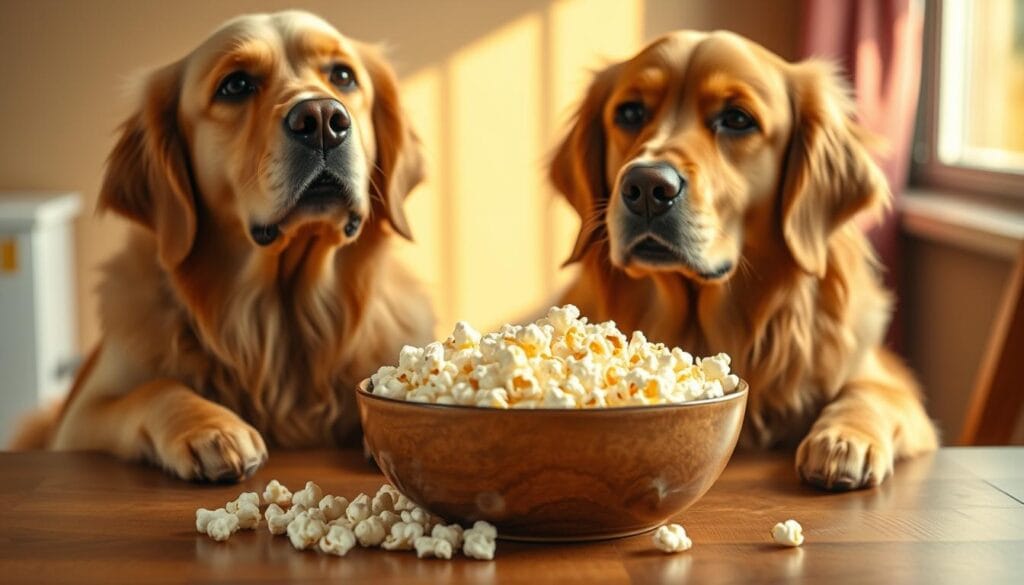Table of Contents
As a dog owner, I’ve always been careful about giving human snacks to my pet. Many pet parents wonder: can popcorn kill dogs? The answer is not as simple as yes or no.
Dogs eating popcorn isn’t always bad. But, some conditions can make it dangerous. How popcorn is made, seasoned, and eaten affects your dog’s health.
It’s important to know the risks of dogs eating popcorn. Not all popcorn is safe for dogs. What seems harmless could actually be risky for your pet.
Key Takeaways
- Popcorn isn’t toxic to dogs but can be risky
- Unpopped kernels pose significant choking hazards
- Butter and salt can cause serious health issues
- Plain, air-popped popcorn is the safest option
- Moderation is key when sharing popcorn with dogs
The Safety of Popcorn for Dogs: An Overview
Dog owners often wonder if they can share snacks with their pets. Popcorn can be tricky for dogs. It’s important to know what popcorn is safe for them.
What Makes Popcorn Potentially Dangerous
Not all popcorn is safe for dogs. The dangerous kinds have lots of additives and seasonings. The main risks are:
- Too much salt
- Butter and oil
- Artificial flavors
- Choking hazards
Types of Popcorn to Avoid
Some popcorn is a big no-no for dogs. Stay away from:
- Microwave popcorn with chemicals
- Heavily salted popcorn
- Caramel or cheese-flavored popcorn
- Popcorn with chocolate or other toxic toppings
Safe Popcorn Options for Dogs
For safe popcorn, go for plain air-popped corn. Make it without any seasonings or oils. A few plain, unsalted kernels can be a treat for your dog.
Remember: Moderation is key when introducing any new food to your dog’s diet.
Always talk to your vet before adding new snacks to your dog’s diet. While plain popcorn is safe in small amounts, it should not replace a balanced dog diet.
Nutritional Value of Popcorn for Dogs
When thinking about popcorn for dogs, it’s key to know its limited nutritional benefits. Popcorn isn’t packed with nutrients, but it does have some trace elements that might catch pet owners’ attention.
The benefits of popcorn for dogs are quite small. It has tiny amounts of essential nutrients that offer a bit of nutritional value:
- B vitamins (riboflavin and thiamine)
- Trace minerals like magnesium
- Dietary fiber
Popcorn shouldn’t be seen as a big part of a dog’s diet. The trace nutrients in plain, air-popped popcorn include:
| Nutrient | Benefit for Dogs | Quantity per Cup |
|---|---|---|
| Riboflavin | Supports metabolism | 0.1 mg |
| Thiamine | Aids energy production | 0.07 mg |
| Magnesium | Supports bone health | 34 mg |
The benefits of popcorn for dogs are quite limited. Dogs need a balanced diet from specialized dog food, and popcorn should only be an occasional treat. Pet owners should focus on giving nutritionally complete meals instead of relying on popcorn as a main food source.
Veterinarians say to treat popcorn as an occasional snack, not a nutritional supplement. Always give plain, unsalted, and unbuttered popcorn in small amounts to avoid health risks.
Can Popcorn Kill Dogs: Essential Facts and Risks
It’s important for pet owners to know the dangers of popcorn for dogs. Popcorn isn’t deadly by itself, but some situations can be very risky. These risks go beyond just a snack.
Dogs can face health problems from eating popcorn, based on how it’s made and how much they eat. These issues can be mild or very serious.
Immediate Health Concerns
There are serious health risks for dogs when they eat popcorn:
- Choking hazards from unpopped kernels
- Potential digestive blockages
- Sodium toxicity from seasoned varieties
- Risk of intestinal inflammation
Long-term Health Effects
Regularly eating popcorn can lead to bigger health issues for dogs:
- Potential weight gain
- Increased risk of pancreatitis
- Potential nutritional imbalances
- Possible digestive system complications
Warning Signs to Watch For
Look out for these signs after your dog eats popcorn:
- Excessive vomiting
- Difficulty breathing
- Unusual lethargy
- Abdominal discomfort
If you see any of these symptoms, talk to your vet right away.
Common Popcorn Hazards for Dogs

Dog owners need to know about the dangers of popcorn for their pets. Unpopped kernels and some toppings can be very harmful. These hazards can lead to serious health problems.
The main risks of popcorn for dogs include:
- Choking hazards from hard, unpopped kernels
- Potential dental damage from hard kernel pieces
- Digestive tract blockages
- Sodium and fat-related health complications
Unpopped kernels are a big threat to dogs. They can crack teeth, cause mouth injuries, and pose serious choking risks. Small dogs are especially at risk.
“Prevention is always better than treatment when it comes to your dog’s safety.” – Veterinary Nutrition Expert
Dangerous toppings make popcorn even more risky for dogs. Salt, butter, and artificial seasonings can cause many health issues. These include:
| Topping | Potential Health Risk |
|---|---|
| Butter | Pancreatitis |
| Salt | Sodium ion poisoning |
| Caramel | Digestive upset |
Knowing these risks helps keep your dog safe. Always talk to your vet before giving your dog human snacks.
Safe Ways to Serve Popcorn to Your Dog
Sharing snacks with your furry friend can be fun. But, when it comes to popcorn, caution is key. Learning how to feed dogs popcorn safely requires understanding specific guidelines and preparation methods that protect your pet’s health.
Dogs can enjoy popcorn as an occasional treat when prepared correctly. Safe popcorn for dogs involves careful selection and minimal processing to prevent potential health risks.
Proper Portion Sizes
Controlling popcorn portions is crucial for your dog’s diet. Follow these serving guidelines:
- Small dogs: 1-2 pieces of plain popcorn
- Medium dogs: 3-5 pieces of plain popcorn
- Large dogs: 5-10 pieces of plain popcorn
Preparation Methods
When preparing popcorn for your dog, stick to these essential rules:
- Use air-popped popcorn only
- Remove all unpopped kernels
- Avoid adding salt, butter, or seasonings
- Serve plain and unseasoned
Feeding Guidelines
Integrate popcorn sparingly into your dog’s diet. Popcorn should represent no more than 10% of their daily calorie intake. Always supervise your dog while eating and introduce new treats gradually.
Remember: Plain, unseasoned popcorn is the safest option for canine snacking.
Dangerous Popcorn Toppings and Additives
Sharing popcorn with your dog can be tricky. Not all toppings are safe. Many toppings can harm your dog’s health. It’s important to know which ones to avoid.
Some toppings are especially dangerous. Here are a few:
- Butter: High in fat and can cause pancreatitis
- Salt: Leads to sodium ion poisoning
- Artificial cheese flavoring
- Caramel and sweet coatings
- Garlic or onion powder
Xylitol, found in some flavored popcorn, is very toxic. Even a little can cause serious problems. It can lead to low blood sugar and liver failure.
“Prevention is always better than cure when it comes to your dog’s diet.” – Veterinary Nutrition Experts
The best way to keep your dog safe is to give them plain, air-popped popcorn. This way, you avoid the risks of harmful toppings.
Signs of Popcorn-Related Distress in Dogs
Knowing the signs of popcorn-related issues in dogs is key. It helps spot health risks early. Popcorn poisoning in dogs can show through various warning signs that need quick action.
Dogs can react differently to popcorn, from mild stomach problems to serious issues. Spotting these symptoms early can stop health crises.
Digestive Complications
Dog popcorn symptoms that affect digestion include:
- Sudden vomiting
- Persistent diarrhea
- Abdominal pain or discomfort
- Loss of appetite
- Unusual lethargy
Choking Hazards
Unpopped kernels and big popcorn pieces are choking hazards for dogs. Look out for these critical signs:
- Excessive coughing
- Gagging
- Difficulty breathing
- Pawing at the mouth
- Panic or distress
Veterinary Intervention
Popcorn poisoning in dogs might need a vet’s check. Call your vet right away if you see:
| Symptom Category | Urgent Warning Signs |
|---|---|
| Digestive Distress | Persistent vomiting over 24 hours |
| Neurological Changes | Disorientation or sudden weakness |
| Respiratory Issues | Labored breathing or continuous coughing |
| Hydration Concerns | Excessive thirst or reduced urination |
Always prioritize your dog’s health and seek professional guidance when uncertain about their condition.
Alternative Healthy Snacks for Dogs

Finding safe and nutritious snacks for your dog can change their diet for the better. Healthy dog snacks are key to keeping your pet happy and healthy. They make treat time fun and exciting.
Dogs enjoy trying new foods, and there are many popcorn alternatives that are good for them. Here are some tasty and healthy dog snacks:
- Frozen Blueberries: Low-calorie and packed with antioxidants
- Carrot sticks: Crunchy and great for dental health
- Apple slices (without seeds): Rich in vitamins and fiber
- Cucumber chunks: Hydrating and low in calories
- Sweet potato cubes: Nutrient-dense and easily digestible
When looking for popcorn alternatives, choose snacks that are good for your dog. Commercial dog treats can also be great, especially those made for canine health. Look for treats with:
- Natural ingredients
- No artificial preservatives
- Balanced nutritional profile
- Appropriate size for your dog’s breed
Always introduce new snacks slowly and in small amounts. Talk to your vet to make sure the snacks you choose are right for your dog. They can help match snacks to your dog’s diet and health needs.
Understanding Kernels and Choking Risks
Popcorn kernels are a big danger for dogs, especially choking risks. Small and medium-sized dogs are at high risk because they can easily choke on these hard kernels.
Dogs are curious and might try to eat popcorn kernels. But this can lead to serious health problems. The hard kernels can cause dental damage, throat obstruction, internal injury, and choking.
- Dental damage from attempting to chew kernels
- Potential throat obstruction
- Risk of internal injury
- Choking hazard
Small dogs are especially vulnerable to popcorn kernels dog choking incidents. Their smaller airways make them more likely to choke on kernels.
“Prevention is always better than emergency treatment when it comes to your dog’s safety.” – Veterinary Safety Expert
Always remove all unpopped kernels before giving popcorn to your dog. Check the bowl carefully before offering any popcorn. This ensures no dangerous kernels are left that could cause choking or dental problems.
Veterinarians advise being very careful with popcorn. This is especially true for puppies, senior dogs, and smaller breeds. They are more vulnerable to choking hazards.
Preventing Popcorn-Related Accidents
To keep your dog safe from popcorn, you need to take steps ahead of time. It’s all about knowing the dangers and setting up safe zones at home.
Here are some ways to protect your dog from popcorn mishaps:
- Store popcorn in sealed, high cabinets out of your dog’s reach
- Use child-proof containers to prevent accidental access
- Clean up popcorn spills immediately
- Supervise dogs during movie nights or snack times
When making popcorn, make sure the area is safe for your dog. Follow these tips:
- Keep dogs in a separate room while making popcorn
- Use a covered popcorn maker to minimize falling kernels
- Dispose of unpopped kernels in a sealed trash container
It’s important to know about choking hazards from popcorn. Unpopped kernels and hard popcorn can be very dangerous for dogs.
| Risk Level | Popcorn Type | Potential Danger |
|---|---|---|
| High Risk | Unpopped Kernels | Choking Hazard |
| Medium Risk | Salted Popcorn | Sodium Overload |
| Low Risk | Plain Air-Popped | Minimal Concerns |
By taking these steps, you can lower the chance of popcorn accidents. This way, your dog can enjoy snacks safely.
Conclusion
Your dog’s health is the most important thing when thinking about popcorn as a treat. While popcorn isn’t toxic, it needs careful handling. Plain, air-popped popcorn without any extras can be a rare snack in small amounts.
It’s crucial to know the risks of popcorn for dogs. Unpopped kernels can be a choking hazard. And, salt, butter, or artificial flavors can upset their stomachs or cause bigger health issues. Always watch your dog closely when trying new foods.
Vets suggest safer treats for your dog. Fruits, veggies, and dog-specific treats are better and safer than popcorn. They offer more nutritional value without the risks.
Being a responsible pet owner means making smart choices about your dog’s food. If you’re unsure, talk to your vet. They can help pick the right treats and amounts for your dog’s health.
FAQ
Is popcorn safe for dogs to eat?
Plain, air-popped popcorn is okay for dogs in small amounts. But, avoid popcorn with butter, salt, or seasonings. These can harm your dog.
Can unpopped kernels be dangerous for my dog?
Yes, unpopped kernels are risky. They can cause choking and harm your dog’s teeth. Always take out kernels before giving popcorn to your pet.
How much popcorn can I safely give my dog?
Popcorn should be a rare treat, not more than 10% of your dog’s daily calories. A few pieces of plain popcorn are enough, depending on your dog’s size.
What popcorn toppings are toxic to dogs?
Stay away from butter, salt, garlic powder, cheese powder, and xylitol. These can lead to serious health problems, from stomach issues to poisoning.
What are the signs of popcorn-related distress in dogs?
Look out for choking, too much thirst, vomiting, diarrhea, tiredness, or belly pain. If your dog shows these signs after eating popcorn, call your vet right away.
Are there healthier alternatives to popcorn for dogs?
Yes, try treats like carrots, cucumber slices, apple pieces (without seeds), or dog treats made for their health. They’re better for your dog and safer.
Can popcorn be fatal to dogs?
Popcorn itself is unlikely to kill dogs. But, choking, severe stomach problems, or reactions to harmful additives can be dangerous. Quick action is key.
How should I prepare popcorn for my dog?
Air-pop popcorn without oil, butter, or seasonings. Let it cool, remove kernels, and give only a few pieces as a rare treat.
Do dogs get any nutritional benefits from popcorn?
Popcorn has little nutritional value for dogs. It has some B vitamins and fiber, but it’s not a key part of their diet.
What should I do if my dog accidentally eats a large amount of seasoned popcorn?
Watch your dog for signs like vomiting, diarrhea, or odd behavior. If these signs last or are bad, call your vet for help.
There are no reviews yet. Be the first one to write one.

